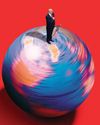Singapore’s Grab And Indonesia’s Go-jek Started Out As Scrappy Taxi Services. Now They’re Expanding Into Banking, Groceries, And More—and Jockeying To Offer The Top “super-app” In Some Of The World’s Fastest-growing Economies.

WE ALL SCREAM FOR ICE CREAM.
THAT’S THE IDEA BEHIND ICE CREAM DAY, a promotion launched by Uber Technologies in 2012. The rideshare giant courts customers by allowing them, for one day each summer, to arrange instant dessert delivery through the Uber app. But in June 2015, as the American powerhouse expanded that campaign across 53 countries, Malaysian entrepreneur Anthony Tan saw a chance to cast Uber as an outsider—and burnish the appeal of his homegrown ride-hailing venture, Grab.
Just after Uber’s event, Grab offered what Malaysians really scream for: smelly durians. Customers in Kuala Lumpur, the capital, could have one of the pungent fruits rushed to their doorstep by a Grab driver. To deliver on that promise, Grab had to devise special packaging: Durians, though considered a great delicacy, emit an odor so overpowering that they are banned in many airports and hotels. Grab surmounted that obstacle and offered the fruits at the bargain price of a single ringgit (24¢). They sold out almost immediately, and the “GrabDurian” marketing coup is now well into its fourth year. “No foreigner would have thought to do that,” chortles Tan. Uber, he says, “couldn’t fully appreciate how local you needed to go” to win in Southeast Asia.
Diese Geschichte stammt aus der April 2019-Ausgabe von Fortune.
Starten Sie Ihre 7-tägige kostenlose Testversion von Magzter GOLD, um auf Tausende kuratierte Premium-Storys sowie über 8.000 Zeitschriften und Zeitungen zuzugreifen.
Bereits Abonnent ? Anmelden
Diese Geschichte stammt aus der April 2019-Ausgabe von Fortune.
Starten Sie Ihre 7-tägige kostenlose Testversion von Magzter GOLD, um auf Tausende kuratierte Premium-Storys sowie über 8.000 Zeitschriften und Zeitungen zuzugreifen.
Bereits Abonnent? Anmelden

THE NEW GOLD RUSH
Gold prices have soared amid global uncertainty and a central-bank-driven buying spree. But this time, the gold mining industry looks very different.

A New Season for Giving
As the PGA TOUR kicks off its 2025 season alongside its sponsors in Hawai'i, the organization is continuing to make an impact in local communities.

WELCOME TO ELONTOWN, USA
The small town of Bastrop, Texas (pop. 12,000), has become a home base for Elon Musk's business empire. What comes next is anyone's guess.

100 MOST POWERFUL PEOPLE
Our inaugural, authoritative ranking of the leaders whose innovation and impact have elevated them to the top of the business world.

ARE CEO SABBATICALS THE ULTIMATE POWER MOVE?
WHEN VENTURE capitalist Jeremy Liew and his wife were dating, they talked about how one day they would take a year to travel the world. \"That's how we'd know we'd made it,\" Liew says.

WHAT ARE THE BEST METRICS FOR MEASURING A STARTUP'S POTENTIAL?
IN HIS 2012 ESSAY \"Startup = Growth,\" Paul Graham talks about a 5% to 7% weekly growth rate as table stakes for startup success. If you're growing 10%, he says, you're doing \"exceptionally well.\"

TECH POLYMARKET'S ELECTION ACCURACY MADE SHAYNE COPLAN A STAR-BUT AN FBI RAID POINTS TO TROUBLE AHEAD
IN NOVEMBER, Shayne Coplan had a week he'll remember for the rest of his life: He got a phone call from the highest echelons at Mar-a-Lago. He went on TV for the first time. And his New York City apartment was raided by the FBI.

WHY BIG TECH IS THE NUCLEAR INDUSTRY'S NEW BEST FRIEND
OVER THE PAST several years, Big Tech firms like Google and Microsoft have trumpeted ambitious plans to go carbon-neutral, or even carbon-negative, by 2030. But then the generative-AI boom came along and threw a giant wrench in their plans.

WHAT PALMER LUCKEY, THE MAN REVOLUTIONIZING WARFARE, IS AFRAID OF
PALMER LUCKEY, the founder of the $14 billion Al-powered weapons startup Anduril, has become the face of change in the defense industry.

GLOBAL BUSINESS BRACES FOR TRUMP 2.0
AROUND THE WORLD in 2024, voters chose change: in South Africa, France, Britain, and Japan. But nowhere does the anti-incumbent trend matter more than in the United States.